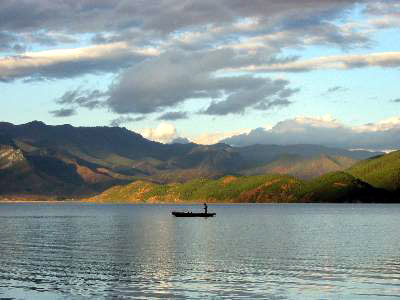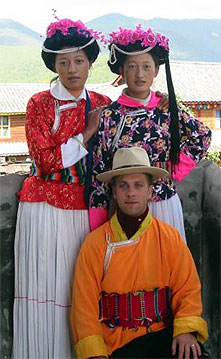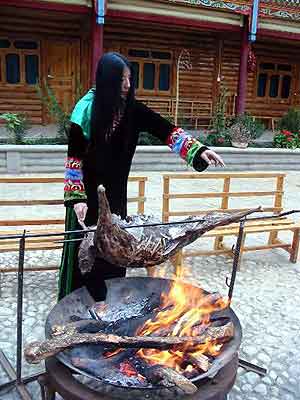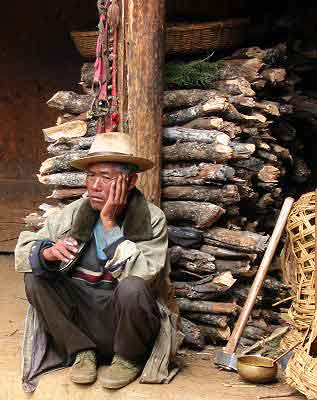In Search of the Holistic Vasectomy
 Lake Lugu, in China’s Northern Yunan Province; home of the aboriginal Mosuo tribe, the last purely matriarchal people left in China. The Mosuo are best known for their practice of walking marriage, a form of poly-amoury in which the women – masters of the household – chose their lovers for the evening from among the men of the tribe. Children are raised semi-communally, taking the mother’s name and living in the mother’s home. Theirs, according to all accounts, is a pure love, devoid of jealousy, duplicity or shame.
Lake Lugu, in China’s Northern Yunan Province; home of the aboriginal Mosuo tribe, the last purely matriarchal people left in China. The Mosuo are best known for their practice of walking marriage, a form of poly-amoury in which the women – masters of the household – chose their lovers for the evening from among the men of the tribe. Children are raised semi-communally, taking the mother’s name and living in the mother’s home. Theirs, according to all accounts, is a pure love, devoid of jealousy, duplicity or shame.
The men of Lugu are handsome, the women beautiful, and most all are skilled equestrians. Their village sits at an elevation of around 7500 feet above sea level in the mountains just south of Tibet. The Mosuo themselves practice a form of Buddhism akin to their cousins to the north. The lake is a sacred place, 30 square miles of pure indigo, broken only by a few small, lush islands dotted with Tibetan temples and one unused monastery.
I’d come to Lugu on a dubious mission, having heard tale from a reputable magazine editor in Beijing of a Mosuo Shamaness with an unusual procedure by which a man could be rendered fully sterile with no loss whatsoever to his virility. This procedure, according to what I’d heard, was permanent, nearly painless and required no surgery. In other words, holistic vasectomy by hand. So my mission was purely journalistic in nature. That I was able to spend four days in paradise in pursuit of said mission, well…call it a lucky bonus.
Arriving in the village after a six hour minibus ride that was both frightening and breathtaking, I immediately  got to work trying to locate the good doctor. I stopped into the first pharmacy I saw (every small town in China has at least a few of these, denoted by a red cross inside a white flower) and explained my predicament. But how does one explain to complete strangers that one is seeking a witch doctor who performs vasectomies by hand? Not knowing the word for “vasectomy” in Mosuo (or Mandarin, for that matter), I resorted to pidgin linguistics.
got to work trying to locate the good doctor. I stopped into the first pharmacy I saw (every small town in China has at least a few of these, denoted by a red cross inside a white flower) and explained my predicament. But how does one explain to complete strangers that one is seeking a witch doctor who performs vasectomies by hand? Not knowing the word for “vasectomy” in Mosuo (or Mandarin, for that matter), I resorted to pidgin linguistics.
“I’m a journalist, and I’m writing an article for a magazine about a doctor who I hear lives in Lugu. She has this…treatment, by which she can take a man’s testicles, and using only her hands, make it so that he cannot make a woman pregnant.”
The pharmacist, a woman, just stared at me. “What?”
I repeated myself, this time making a gesture roughly akin to what I assumed this doctor’s method looked like.
“She snaps pea pods?” she asked.
“In a sense, yes.” I answered.
 “I’ve never heard of anything so crazy.” Said the pharmacist, and went back to dusting off her cough syrup bottles.
“I’ve never heard of anything so crazy.” Said the pharmacist, and went back to dusting off her cough syrup bottles.
Over the course of the next two days, I searched the town high and low for my witch doctor, becoming more and more convinced that my editor in Beijing had inadvertently given me a bum steer.
I asked every pharmacist and doctor I could find, and traveled to two neighboring villages. One man grimaced as I explained the procedure to him. “No Mosuo man would undergo such a procedure,” he told me.
“But I hear it’s painless…” I countered weakly.
“Well, if you find this doctor, you get it done and come back and tell me how painless it really is!” He said.
Ms. Tsao, the proprietress of my hotel (“The Customal Hotel of the Girl Kingdom”) was sympathetic. On the last evening before I left, we sat down together and shared some tea. She told me that I wasn’t first person to come to Lugu in search of a myth. “Lots of people have strange ideas about we Mosuo people. Some come here looking for a good time, thinking that because we practice open marriage that we are easy. They leave knowing better.”
She continued on, in a maternal tone without a hint of condescension.
“And you came here looking for a doctor who performs vasectomies by hand, a doctor who, to my knowledge, doesn’t exist. But we are glad that you came anyway.”
So I’d failed to find what I’d come looking for. But on the shore of an indigo lake, under a brilliant canopy of stars, in a town filled with some of the purest, most beautiful people I’d ever encountered, journalistic failure seemed an irrelevant concept indeed.

